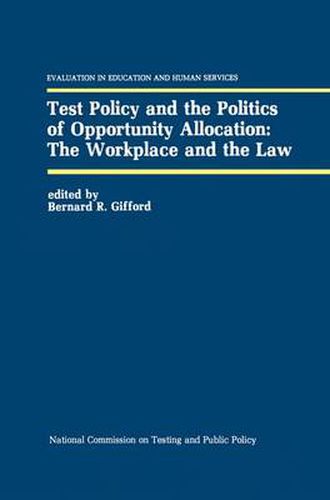Readings Newsletter
Become a Readings Member to make your shopping experience even easier.
Sign in or sign up for free!
You’re not far away from qualifying for FREE standard shipping within Australia
You’ve qualified for FREE standard shipping within Australia
The cart is loading…






This title is printed to order. This book may have been self-published. If so, we cannot guarantee the quality of the content. In the main most books will have gone through the editing process however some may not. We therefore suggest that you be aware of this before ordering this book. If in doubt check either the author or publisher’s details as we are unable to accept any returns unless they are faulty. Please contact us if you have any questions.
Bernard R. Gifford In the United States, the standardized test has become one of the major sources of information for reducing uncertainty in the determination of individual merit and in the allocation of merit-based educational, training, and employment opportunities. Most major institutions of higher education require applicants to supplement their records of academic achievements with scores on standardized tests. Similarly, in the workplace, as a condition of employment or assignment to training programs, more and more employers are requiring prospective employees to sit for standardized tests. In short, with increasing frequency and intensity, individual members of the political economy are required to transmit to the opportunity marketplace scores on standardized examinations that purport to be objective measures of their and potential. In many instances, these test scores are the abilities, talents, only signals about their skills that job applicants are permitted to send to prospective employers. THE NATIONAL COMMISSION ON TESTING AND PUBLIC POLICY In view of the importance of these issues to our current national agenda, it was proposed that the Human Rights and Governance and the Education and Culture Programs of the Ford Foundation support the establishment of a “blue ribbon National Commission on Testing and Public Policy to investigate some of the major problems as well as the untapped opportunities created by recent trends in the use of standardized tests, particularly in the workplace and in schools.
$9.00 standard shipping within Australia
FREE standard shipping within Australia for orders over $100.00
Express & International shipping calculated at checkout
This title is printed to order. This book may have been self-published. If so, we cannot guarantee the quality of the content. In the main most books will have gone through the editing process however some may not. We therefore suggest that you be aware of this before ordering this book. If in doubt check either the author or publisher’s details as we are unable to accept any returns unless they are faulty. Please contact us if you have any questions.
Bernard R. Gifford In the United States, the standardized test has become one of the major sources of information for reducing uncertainty in the determination of individual merit and in the allocation of merit-based educational, training, and employment opportunities. Most major institutions of higher education require applicants to supplement their records of academic achievements with scores on standardized tests. Similarly, in the workplace, as a condition of employment or assignment to training programs, more and more employers are requiring prospective employees to sit for standardized tests. In short, with increasing frequency and intensity, individual members of the political economy are required to transmit to the opportunity marketplace scores on standardized examinations that purport to be objective measures of their and potential. In many instances, these test scores are the abilities, talents, only signals about their skills that job applicants are permitted to send to prospective employers. THE NATIONAL COMMISSION ON TESTING AND PUBLIC POLICY In view of the importance of these issues to our current national agenda, it was proposed that the Human Rights and Governance and the Education and Culture Programs of the Ford Foundation support the establishment of a “blue ribbon National Commission on Testing and Public Policy to investigate some of the major problems as well as the untapped opportunities created by recent trends in the use of standardized tests, particularly in the workplace and in schools.